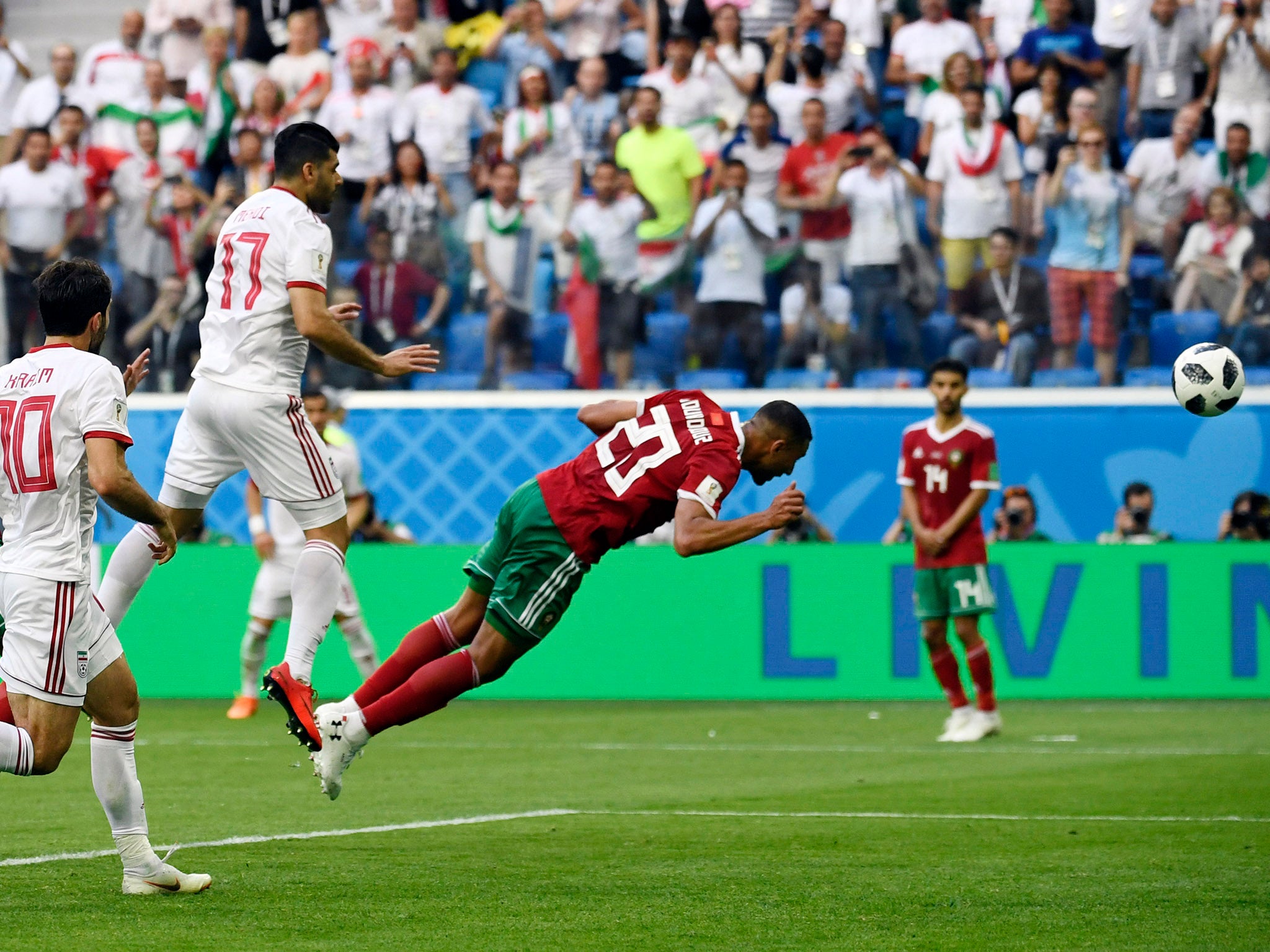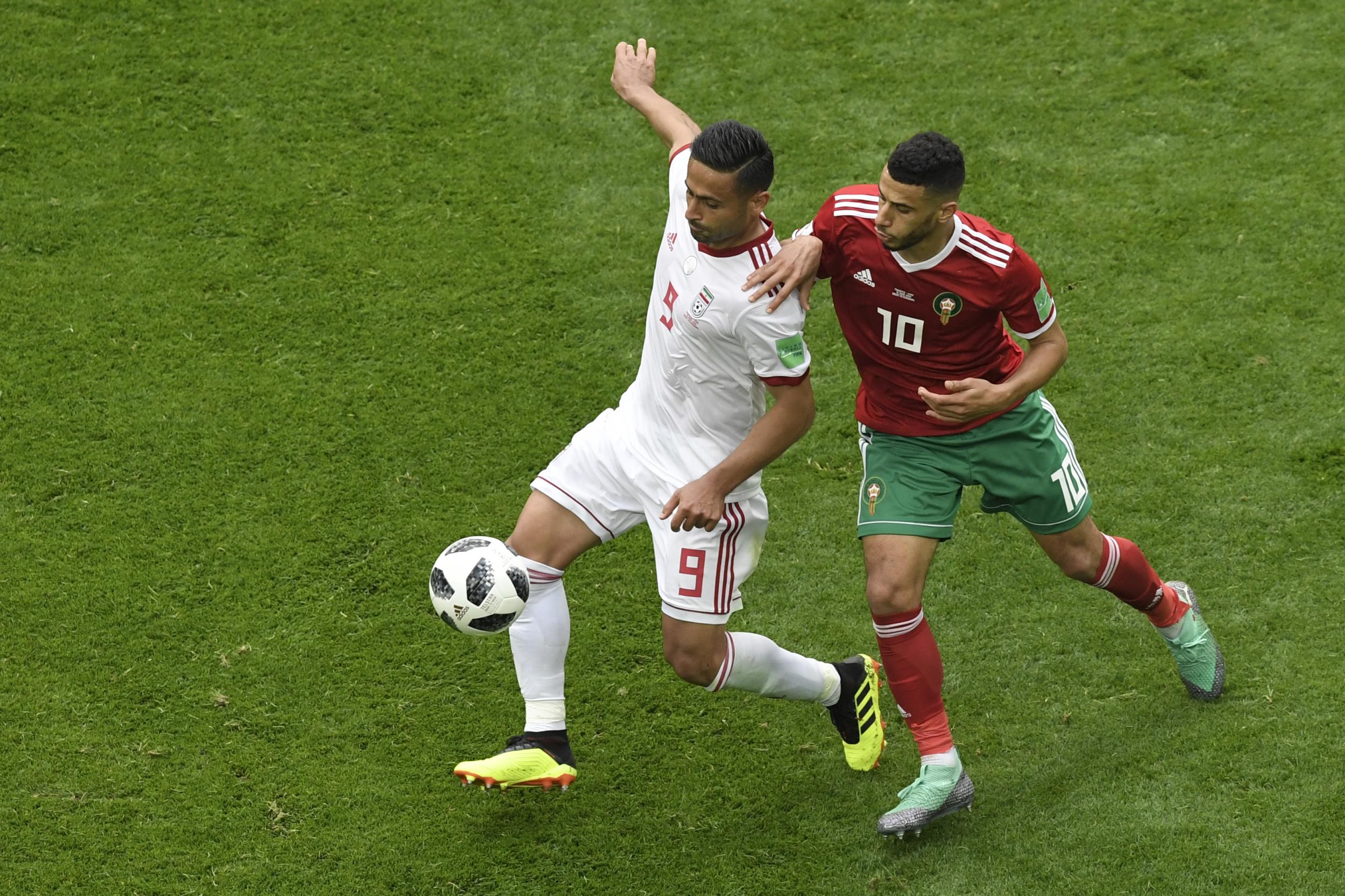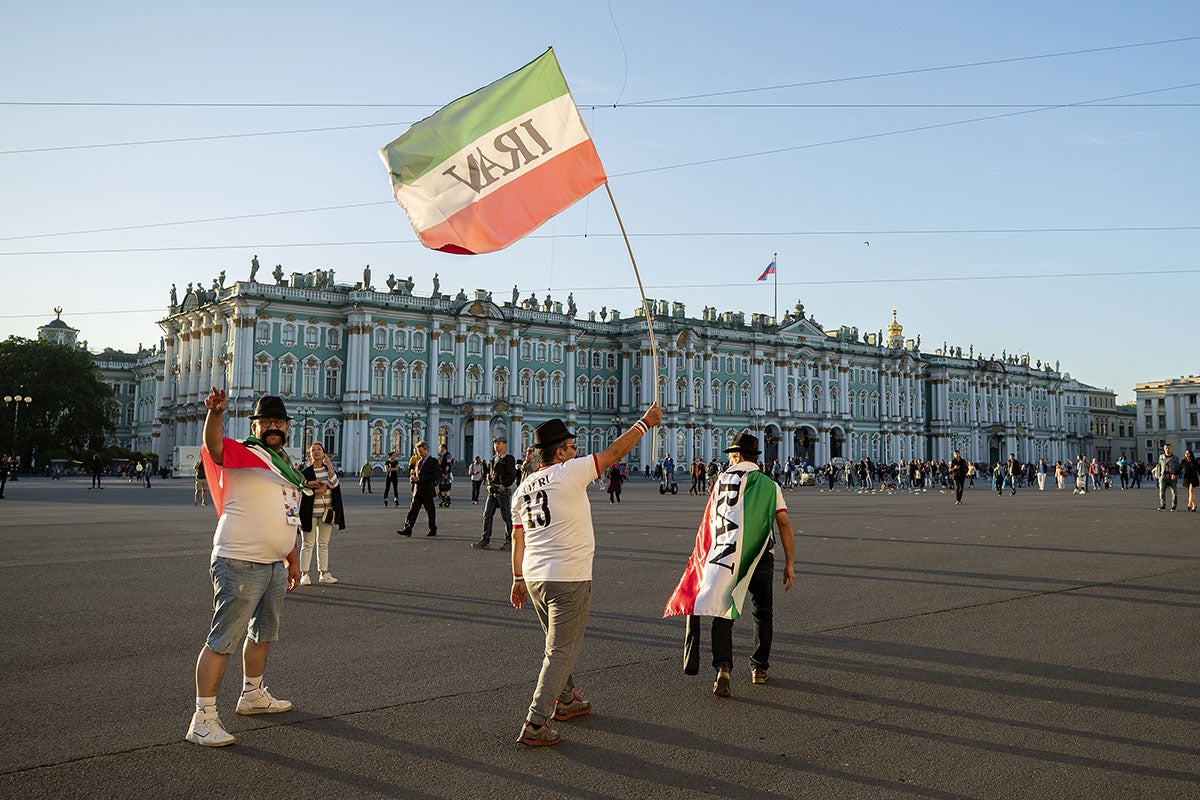Morocco vs Iran: Aziz Bouhaddouz’s dramatic own goal in added time seals second ever Iranian World Cup win
Morocco 0-1 Iran: A miscued diving header by Aziz Bouhaddouz diverted a 95th-minute free-kick into Morocco's net to spark delirious Iranian celebrations
When the final whistle went, seconds after the goal, the Iran players did not know whether to throw themselves to the ground or up into the air. They were confounded by their own disbelief; that they had done it, and that they had done it like this.
Iran had won their first World Cup game for 20 years, and just the second in their history.
They had beaten Morocco 1-0 thanks to a freakish own-goal in the 95th minute from the unfortunate substitute Aziz Bouhaddouz, diving to head away a free-kick, diverting it unstoppably past his own goalkeeper, into his own net. They had won despite being desperately, dramatically out-played for the first 20 minutes of the game. They barely got a touch, resorted to fouling far earlier than they would have liked and looked like they were on the brink of a shoeing.
But at the end it was the Moroccan players left with the bitterest pain imaginable, darting down the tunnel before it all sunk in. Their World Cup is over already, with Portugal and Spain left to play. It is almost impossible to see how they can progress out of Group B from here.
What will hurt Morocco more than anything is their obvious early superiority, the chances they missed and the sense in those exciting early minutes that this was a team who would be worth watching this month. Because not many teams - especially from outside the favourites - will try to start games like this.
The whole afternoon here felt like a test, and eventually like a cautionary tale, for the different ways international teams can play. As we all know, the sad fact of modern international football is that it is easier to teach teams to defend than to attack in a short time-span. That is why so many teams will arrive in Russia hoping to defend deep, keep it tight and wait for an opening on the break.

That is exactly what Iran did, and what Carlos Quieroz has specialised in in his seven years in the job. He took Iran to the 2014 World Cup, emerged with their image enhanced, frustrating even Argentina until the last minute, and impressed again during qualification for this tournament. Iran did not lose one qualifier, conceding two goals in 10 games. They are unbeaten in 22 competitive games, and were the first team to book their place for Russia.
Who can blame Quieroz for that? Defensive football worked for Iceland and Portugal in 2016, it worked for Greece in 2004. And, ultimately, it worked for them here. Yes, Iran did not get a kick at the start but eventually they found openings on the break. Karim Ansarifard got through in the first half, and just before half-time Sardar Azmoun and Alireza Jahanbakhsh forced a double save from Monir El Kajoui.
That was as good as it got from Iran in the first half, beyond a few clever set plays Quieroz had worked on. Vahid Amiri threw in a disguised crouching short throw-in amongst his longer efforts, Ehsan Haji Safi whistled a long-range free-kick just over. They never threatened again in open play, but they did not need to. Because Haji Safi’s 95th minute free-kick ended up, fortuitously enough, in the Moroccan net. Quieroz’s approach was vindicated, later than anyone could have imagined.

And what of Herve Renard? He wanted to repudiate the conventional wisdom about how international teams are meant to play. No two banks of four here from the glamorous, cavalier adventurer. Morocco began playing inventive, expansive, adventurous football, the type of football we are not meant to expect on day two of a tournament like this.
Nourredine Amrabat played so high and wide on the right he looked like a winger, not a full-back. Karim El Ahmadi was the only holder while his team-mates, busily interchanging roles, took it in turns to drop back and launch attacks. Hakim Ziyech hit long balls over the top, Younes Belhanda wriggled out of smallest spaces, both of them desperate to take the ball where others would not. It gave you the thrill of watching of a trapeze artist; difficult, dangerous and never quite under control.
But it did not work. Morocco had 64% possession but their chances were never as good as they should have been. Amine Harit might have done better twice, volleying one shot almost out for a throw-in, Ayoub El Kaabi sliced one wide from the edge of the box, but the longer the game went on, the less dangerous Morocco looked. They had their moment, the first half of the first half, and having blown it they could not get it back. When Ziyech forced a save with 10 minutes left it felt unfamiliar, almost surprising, simply because Ali Beiranvand in the Iranian goal had not had a difficult save to make all night.

Renard aimed high and lost. Who knows whether a more cautious, traditional approach might have reaped better results, whether it would have made the most of his attacking talent and still beaten Iran. But here he did not just try to beat Quieroz’s oppostion. He tried to take on the conventional wisdom, that the way to impress in tournaments is with a deep, compact 4-4-2. And Quieroz, a canny master of that style of play, emerged with the points.
Morocco (4-2-3-1) El Kajoui; N. Amrabat (S. Amrabat, 76), Benatia, Saiss, Hakimi; El Ahmadi, Boussoufa; Belhanda, Ziyech, Harit (Da Costa, 83); El Kaabi (Bouhaddouz, 77)
Iran (4-4-1-1) Beiranvand; Rezaeian, Pouraliganji, Cheshmi, Haji Safi; Jahanbakhsh (Ghoddos 85), Ebrahimi (Montazeri, 80), Amiri, Ansarifard; Shojaei (Taremi, 67); Azmoun
Join our commenting forum
Join thought-provoking conversations, follow other Independent readers and see their replies
Comments
Bookmark popover
Removed from bookmarks